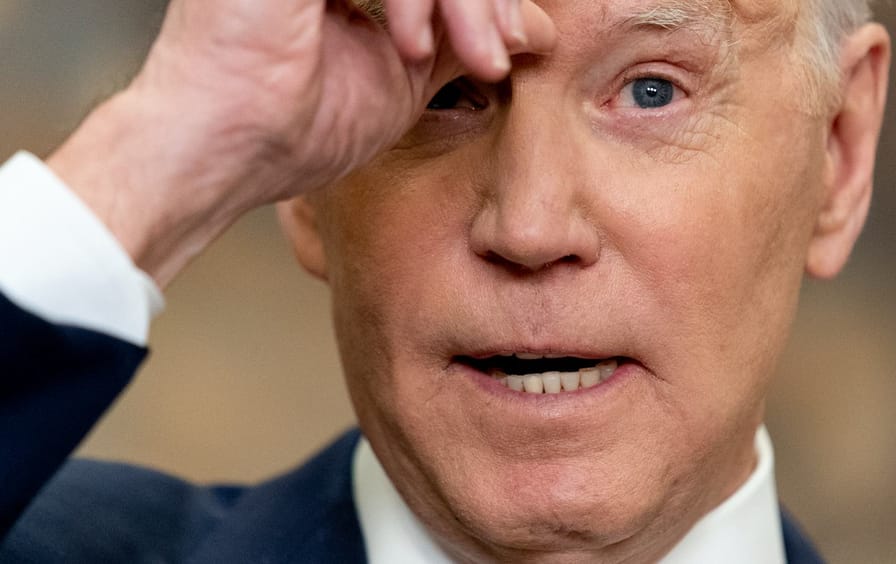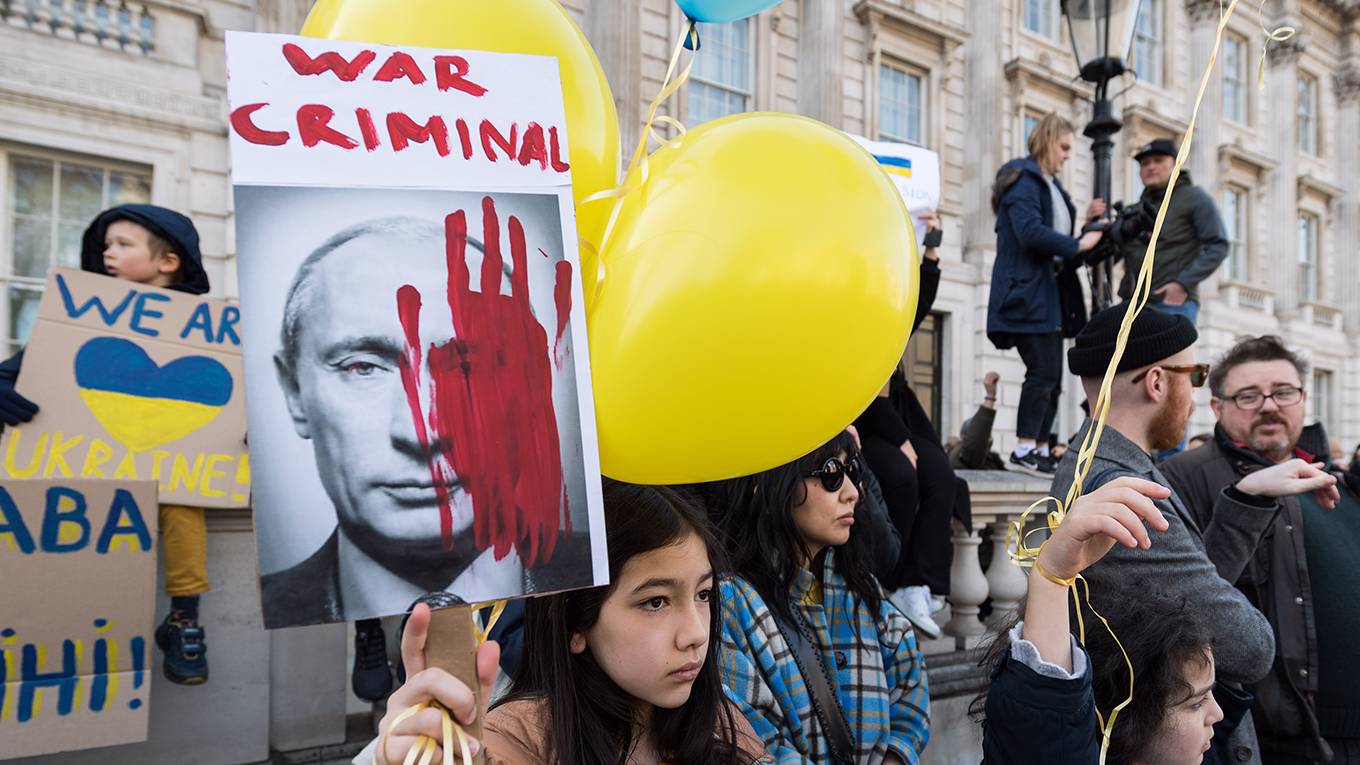Biden’s move to ban Russian oil imports shows he can act boldly when he wants to.
By Jean Su and Maya Golden-Krasner

President Joe Biden announces a ban on Russian oil imports in retaliation for its invasion of Ukraine. (Andrew Harnik / AP Photo)
Earlier this week, President Biden banned all oil and energy imports from Russia, punishing Vladimir Putin for his brutal war against Ukraine and building upon an earlier package of historic economic sanctions.
Biden’s actions are a steely acknowledgment that our reliance on Russian fossil fuels threatens both national and global security. They are also tangible evidence that Biden can act quickly and boldly to confront national emergencies when he chooses to.
One emergency that Biden must now act on with similar urgency is climate change. In fact, there is no greater emergency. As UN Secretary General Antonio Guterres put it, the climate crisis is drawing an “atlas of human suffering” around the world. Defusing this crisis will require major changes in how we get our energy—both in the United States and around the world. Global emissions of heat-trapping gases must be cut in half by 2030—and even faster in the US, as the largest historic climate polluter pays its fair share of climate debt—if humanity is to keep temperatures from rising more than 1.5 degrees Celsius above preindustrial levels, which most experts agree will be essential to stave off the most catastrophic effects of climate change. And making those cuts will require phasing out oil, gas, and other fossil fuels as rapidly as possible.
The confluence of the climate emergency and Russia’s war in Ukraine make this moment an ideal opportunity for Biden to declare a national climate emergency. In fact, during a Tuesday morning speech announcing the import ban, Biden seemed to acknowledge that the two issues are intertwined. Russia’s disruptions, he said, “should motivate us to accelerate the transition to clean energy.”
Since the 1970s, Congress has granted the president various national defense powers that can be deployed during times of genuine emergency. A new legal report from our organization, the Center for Biological Diversity, details how Biden can use these powers to fight climate change—and, in the process, avoid the geopolitical vulnerabilities that come with an overreliance on fossil fuels.
The Defense Production Act, or DPA, is a wartime statute that permits a president to marshal domestic industries to manufacture critical materials needed for the national defense. Historically, it has been used to manufacture weapons for war, but Biden has also invoked the DPA for peaceful means of self-defense: to produce the vaccines and medical supplies needed to battle the coronavirus pandemic.
Now he has an important opportunity to use the act to combat climate change—by stimulating the production and deployment of renewable energy and storage, energy-efficiency technologies, and clean transportation and infrastructure.
CURRENT ISSUE
View our current issue
Subscribe today and Save up to $129.
Specifically, the DPA empowers the president to command private industry to manufacture what the country needs for the national defense. It unlocks funds specific to the DPA but can also leverage the $650 billion annual federal procurement budget to give manufacturers the investment security they need, including government contracts, loans, and grants. All of this could be used to jumpstart the nation’s green manufacturing base and create high quality, green jobs, rejuvenating a Covid-ailing economy.
The DPA also permits the president to allocate these technologies domestically where they’re needed most: in partnership with environmental justice communities that have borne the brunt of climate harms and a racist energy system, helping actualize the president’s environmental justice priorities.
The US could also export green technologies overseas to help other countries transition away from fossil fuels. Doing so would accomplish two things: diluting the geopolitical power of Russia and other petrostates and helping the US meet its legal obligations under the Paris Agreement to provide aid to vulnerable nations in the global South.
Beyond the DPA, Biden could also exercise additional executive powers provided by the National Emergencies Act, the International Emergency Economics Powers Act, and the US Trade Act, to limit not only the import of fossil fuels from countries like Russia, but also the export of those produced here in the United States. If Biden were, for instance, to ban just crude oil exports, he could cut greenhouse gas emissions by up to 165 million metric tons each year—the equivalent of shuttering 42 coal plants.
Prevailing political interests are sure to push him in the opposite direction. Biden must resist the inevitable pressure he will face to expand domestic oil production as a means of offsetting the energy disruptions caused by Russia’s invasion. Exploiting crises to push for more oil production has long been a favorite trick of the fossil fuel lobby, dating back to the time of the OPEC oil embargoes in the 1970s. But more drilling will neither deliver the energy security that fossil fuel companies claim it will nor allow for the rapid phaseout of fossil fuels needed to preserve a livable planet.
Instead of falling for this trap, Biden should direct federal agencies to stop approving new fossil fuel infrastructure projects, which are incompatible with maintaining a safe climate. And he should ratchet down oil and gas production by suspending the offshore drilling leases that the federal government provides to fossil fuel companies and halting extraction.
If Biden were to embrace such a plan and put the nation on a wartime footing to both resist Putin’s aggression and address the climate emergency, he would enjoy strong support from his own party. Senate majority leader Chuck Schumer, Senators Jeff Merkley and Bernie Sanders, and Representatives Earl Blumenauer and Alexandria Ocasio-Cortez are among the congressional leaders pushing the president to use powers provided by the National Emergencies Act to combat climate change. And more than 1,100 public interest organizations from all 50 states and territories have urged Biden to do the same.
These emergency powers are a tremendous opportunity for Biden to overcome the geopolitical threats, price volatility, and climate chaos that fossil fuels generate. The question isn’t whether Biden can take bold climate action—but whether he will.
Jean Su is the Energy Justice Program director and senior attorney at the Center for Biological Diversity, based in Washington, D.C. With Maya Golden-Krasner, she is co-author of The Climate President’s Emergency Powers.






